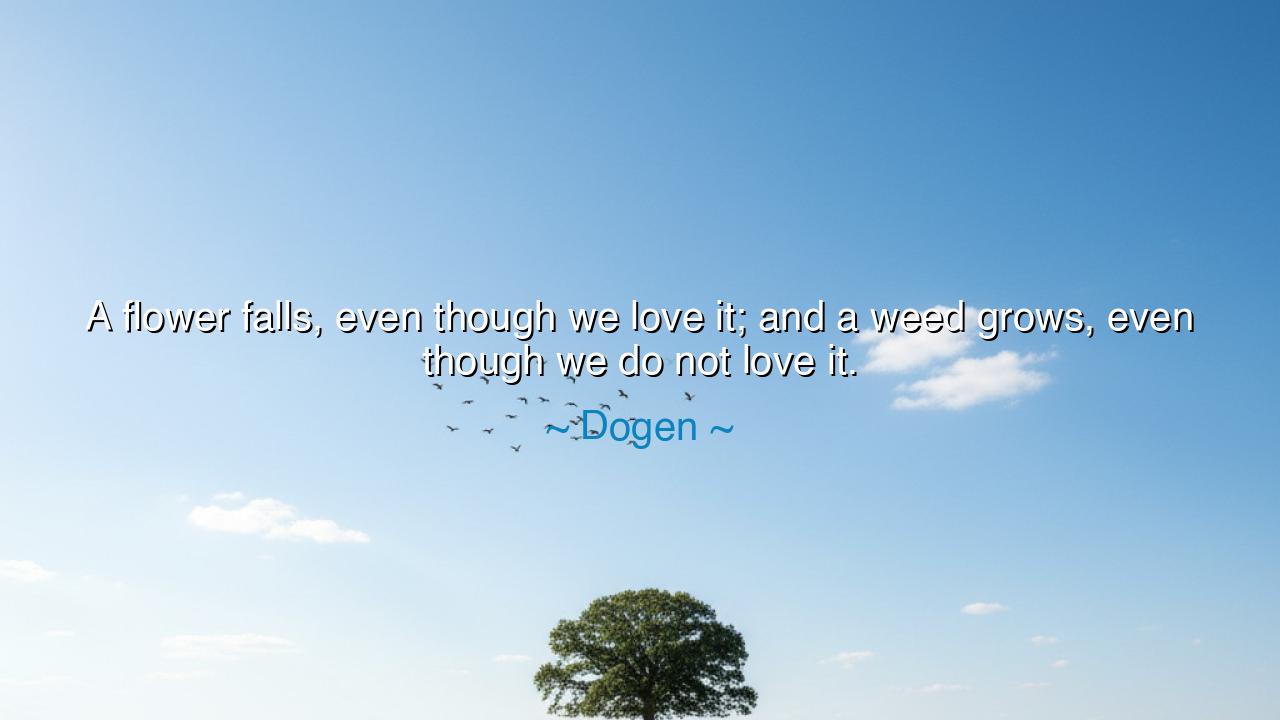
A flower falls, even though we love it; and a weed grows, even
A flower falls, even though we love it; and a weed grows, even though we do not love it.






Hear now the words of Dōgen, the great Zen master of thirteenth-century Japan, who spoke with the voice of mountains and silence: “A flower falls, even though we love it; and a weed grows, even though we do not love it.” In these few words lies the eternal rhythm of life — beauty and sorrow, gain and loss, harmony and struggle intertwined. Dōgen, founder of the Sōtō school of Zen Buddhism, saw deeply into the impermanence of all things. He taught that the world moves by laws beyond our desire, and that peace comes not from resisting this truth, but from embracing it with clarity and compassion.
The flower in his words stands for all that is precious — youth, love, friendship, beauty, and joy. The weed stands for all that is unwanted — pain, disappointment, decay, and loss. Yet both arise from the same earth, nourished by the same rain. This is the paradox of existence: that what we cherish must one day fade, and what we dread will one day return. Dōgen reminds us that no amount of love can make the flower eternal, nor can our dislike prevent the weed from growing. The universe bows to no one’s will; it follows its own quiet, inexorable law. To live in harmony with this truth is to awaken from illusion.
Dōgen’s insight was not born of abstraction, but of contemplation. In his youth, he was tormented by a simple question: if all beings possess the Buddha-nature, why must they suffer and die? He sought the answer across mountains and temples, until he found it not in doctrines but in direct experience — the understanding that impermanence itself is enlightenment. The falling of the flower and the growth of the weed are not tragedies, but the natural unfolding of reality. To cling to one or to resist the other is to create suffering. To accept both with open heart is to be free.
Consider the story of Emperor Ashoka, the mighty ruler of India. In his early reign, he waged brutal wars and conquered vast lands, but victory brought him no peace. Amidst the blood and ashes, he saw that glory fades like a flower, and the weeds of regret and sorrow grow in its place. Yet in this recognition, his heart turned toward compassion. He renounced conquest and embraced the teachings of the Buddha, spreading wisdom instead of fear. Thus, even the weed of his past gave rise to the flower of redemption. Through acceptance, he transformed pain into awakening — as Dōgen would have counseled centuries later.
In every life, the flower falls — the moments we love cannot last. Children grow old, friendships drift apart, dreams wither, seasons change. Yet even as these fade, new forms of life arise — sometimes rough, sometimes unwanted, yet always alive. The weed grows because the world must go on; it reminds us that endings feed beginnings, and that decay is but another name for renewal. The wise do not curse the weed; they study it, learn from it, and see the hidden beauty in its persistence.
To dwell in the truth of Dōgen’s words is to live without resistance. It is to hold the flower gently, knowing it will fall, and to look upon the weed without hatred, knowing it too has its place. This is the essence of Zen — not indifference, but balance. The enlightened one feels fully, loves deeply, mourns honestly, but clings to nothing. Such a person moves with the flow of time, as a leaf upon the river, trusting that every fall and every growth are movements of the same great current.
The lesson, then, is clear: do not waste your days in battle with the inevitable. When you love, love wholly — but without the hunger to possess. When you lose, grieve — but without despair. See the beauty in change, and the wisdom in loss. Each moment, however brief, is complete in itself, as the flower is perfect even in its falling. Each challenge, however unwelcome, holds a teaching, as the weed reminds us that life is resilient and unending.
And so, dear listener, walk through your garden — the garden of your life — with open eyes and steady breath. Cherish the flowers, but do not mourn their passing. Acknowledge the weeds, but do not curse their presence. Tend both with mindfulness, and you will discover what Dōgen saw beneath the surface of the world: that in the falling and the growing, the loved and the unloved, lies the wholeness of existence — and the peace that passes all understanding.






AAdministratorAdministrator
Welcome, honored guests. Please leave a comment, we will respond soon